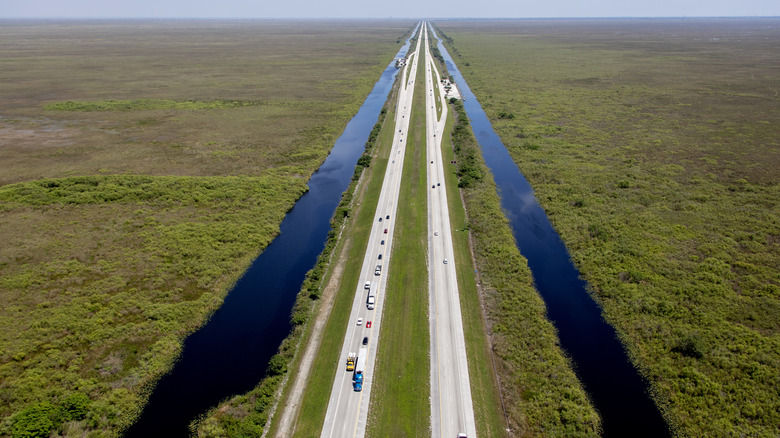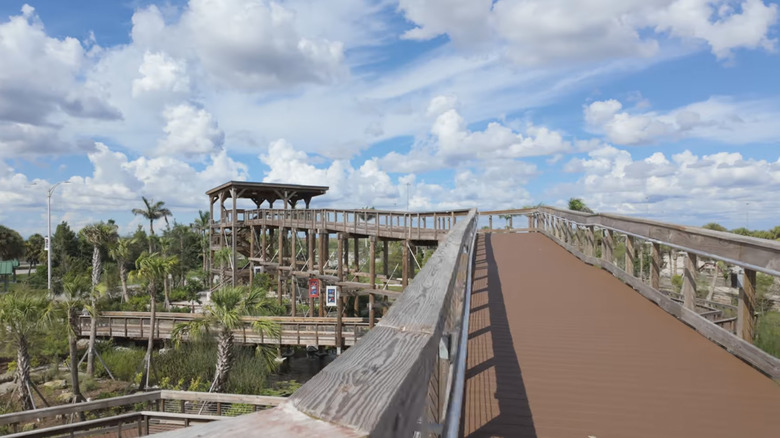The Underrated Stretch Of Everglades Highway With An Elevated Boardwalk To Walk Above Alligators
The most boring road in Florida has gotten a wild new upgrade. The infamous Interstate 75, better known as Alligator Alley, is an east-west stretch of highway slicing through the Everglades for 80 or so miles, connecting Fort Lauderdale and greater Miami with Naples on the Gulf Coast before curving northward. It's a vital corridor, but it's also hot, flat, and has a reputation as mind-numbingly monotonous, unbroken by the usual suspects one finds on most Florida interstates — chain gas stations, fast food franchises, and questionable billboards for personal injury lawyers. Now, drivers along Alligator Alley have new reasons to stop and stretch: a scenic boardwalk with nature, restrooms, picnic tables, and easy on-off access that lets you take in the unique Everglades beauty without detouring from your interstate commute.
Located at the Mile Marker 35 rest stop in Broward County, the new Alligator Alley Environmental Education Center opened in August 2025 after four years of construction and nearly $12 million in funding, most of it from toll revenue collected by the Florida Department of Transportation via the $3.75 each-way toll. The elevated boardwalks allow you to walk above 3 acres of engineered wetlands, observing 13 aquatic species, including alligators, and 31,000 native plants. A 40-foot observation tower offers panoramic views, and other highlights include a dog park, a playground, and a 15-foot bronze alligator sculpture — perfect for that classic Florida pitstop photo opp. With information placards, an arboretum, educational kiosks, shaded seating areas, and vending machines, the destination is designed as a relaxing campus blending Florida's natural ecosystems with its ever-encroaching urban jungle. "This center is only 20 minutes from the Broward entrance to Alligator Alley, but you feel a world away," wrote one reviewer on Yelp.
Mile Marker 35 stirs mixed opinions as development around the Everglades continues
Despite its striking appearance, Alligator Alley's Mile Marker 35 addition has been met with mixed opinions. While the facility was designed to promote environmental education, it's also reignited concerns about Florida's ongoing struggle to preserve its wild spaces even as it builds over them. "Stunning but so sad they kept building on our Everglades," commented one person on Instagram. "I'm assuming housing developments are next," they continued. Another commenter on Facebook wrote, "How much of the wet lands were demolished for this build...."
The critics may have a point. Adjacent to the new Environmental Education Center sits Big Cypress National Preserve, an "Everglades-lite" park full of old-growth cypress and brackish swampland where you may catch glimpses of both crocodiles and alligators — one of the only habitats where the two coexist. Spanning 729,900 acres, Big Cypress was the first designated national preserve in the U.S. and is home to the rare Florida panther, as well as one of the only spots in Florida where you can see the Milky Way at night without a telescope. You can access hiking in Big Cypress off I-75 via Mile Markers 51, 63, and 70.
Supporters argue that the site provides access to and awareness of an important, fragile ecosystem. Cotleur & Hearing, the landscape architectural firm behind the park's design, notes that the "vibrant wetland exhibit" was constructed on a former paved truck parking lot, repurposing an already-developed space. "The Department will provide a safe transportation system that ensures the mobility of people and goods, enhances economic prosperity, and preserves the quality of our environment and communities," states the Florida Department of Transportation's (FDOT) official mission statement. But as the Florida writer behind Florida Rambler put it, "Who knew FDOT sees its mission as bringing us closer to nature?"

